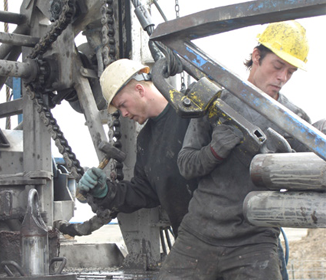In addition to there being many different types of oil field jobs, these careers exist around the world. People working oil field jobs perform functions on and off shore with jobs existing in both white and blue collar categories. Although jobs in the oil field industry exist around the globe, this particular industry has become one of the most valuable in America. We wanted to offer some examples of oil field jobs, what it takes to work in a specific role, and earning potential for each.
Roughneck
Although this is an entry level position, a roughneck actually makes decent money, has job security, and enjoys a chance to learn for advanced career opportunities. Working as a roughneck is not for everyone in that the work is extremely physically demanding so this person would need to be strong, healthy, and agile. Some of the job functions include carrying heavy pipes and related parts, repairing rig problems, operating drilling equipment, and changing drill fittings. However, the main function of the roughneck is to get hold of and attach a connecting pipe that fits in the well shaft. In addition to this function being performed quickly, it is difficult and dangerous.
Driller
The driller oversees work for a single crew. This individual needs to ensure the production of his or her team and make sure the process of drilling remains on task. Additional responsibilities of the driller includes keeping machinery in working condition while drilling and for other job functions and sometimes, the driller acts as supervisor for an outfitting and repair process. Good drillers are always needed, which is why we have seen income climb from $43,000 three years ago to around $47,000 a year currently.
Oil Field Operator
The first of the oil field jobs we wanted to cover is the oil field operator. This individual is responsible for setting up and operation a number of different drills as a means of extracting petroleum products from earth. Other job functions typically include setting up and operating drills to find core matter but also the removal of matter for scientific testing. With this, scientists and oil field professionals can determine quality, type, value, and volume of matter found. The person who works as an oil field operator would also check environmental and safety issues at a specific drill site. Other functions include making sure wells producing oil are running effectively and safely, verifying mechanical and pneumatic pumps in operation are enough for the job, performing inspections on different types of equipment, materials, and structures being used, and maintaining necessary communication among crew members, maintenance workers, and supervisors on and off site.
The best person to work as an oil field operator would be in top physical condition, have excellent vision, and be able to communicate effectively on all levels. In this role, job functions must be performed in alignment with current regulations. In addition, an oil field operator uses specific tools and equipment such as slush pumps, brake pedals, tongs, and powered wrenches.
To work in a role such as this, an individual would need at minimum a high school diploma. However, more companies now prefer an Associate’s degree with focus on geology but along with this, a person with relevant experience would be most desirable. Currently, an oil field operator earns between $50,000 and $55,000 a year with great career advancement options.
Field Manager
Different from an oil field manager, this management position is responsible for overseeing and evaluating employees traveling to customer sites. In most cases, this type of field manager has a team of workers in a specific territory with job functions to include ongoing management of each person on the team. Usually, a Bachelor’s degree with concentration in a technical arena is required although a minor or secondary Bachelor’s degree in business would be highly advantageous.
One of the primary job functions of the field manager is providing initial and ongoing training to field representatives. In addition to assigning representatives with distinct territories, this individual would also handle all staff scheduling, provide teams with supplies and equipment needed to get a job done, and evaluate statistical data. Although teams travel extensively, the actual field manager would typically have a primary location for work. As far as income, on average a person in this role would make around $80,000 a year.
Tool Pusher
Operations on the drill site would be the responsibility of the tool pusher. Along with keeping all crewmembers focused and on task, this person has a huge burden of ensuring production levels are high. While job duties are similar to a line supervisor, the tool pusher maintains control of the entire drilling operation offshore. However, when working on a drill platform at sea, this person would work directly under the drilling platform manager, meaning he or she would not oversee the entire drilling operation. For salary, a tool pusher makes approximately $85,000 a year.
Oil Field Manager
Although all oil field jobs are vital, managers play a key role in the overall performance and function at the job site. This person would be responsible for daily operations and supervise crewmembers. Because this particular job involves a tremendous amount of paperwork, the best candidate would be great at multitasking and pay close attention to detail.
Some of the things that an oil field manager would oversee includes license and contract reviews, monitoring and approving crewmembers regular and overtime pay, keeping operations in line with environmental regulations, and providing, as well as mandating all workers follow set safety standards. This job offers great security and someone with experience could make close to $200,000 a year.
Here are more articles on oil careers:

